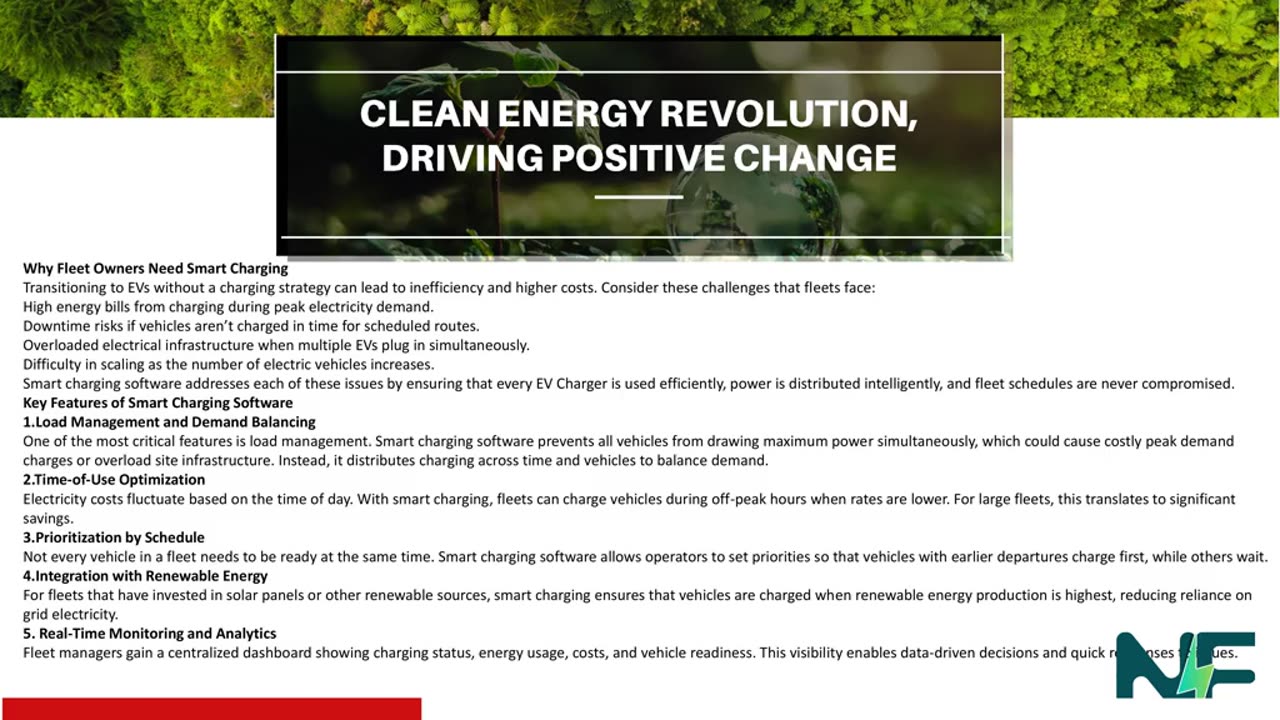Premium Only Content

Smart Charging Software: The Brains Behind Efficient EV Fleet Management
The global shift toward electric mobility is accelerating, and for fleet owners, the transition to electric vehicles (EVs) is no longer a distant possibility — it’s a present-day business imperative. Electric fleets promise lower fuel costs, reduced emissions, and long-term operational savings. But they also bring new challenges, especially when it comes to charging.
Unlike fueling a diesel vehicle at any pump in a few minutes, charging EVs requires planning, timing, and coordination. For fleets, where dozens — or even hundreds — of vehicles must be ready on schedule, this complexity can be overwhelming. That’s where smart charging software comes in. Acting as the brains behind efficient EV fleet management, smart charging software ensures that fleets stay powered up, costs stay under control, and vehicles remain operational when needed.
In this article, we’ll break down how smart charging software works, its benefits for fleet owners, and why it’s the future of electric fleet management.
Understanding Smart Charging Software
At its core, smart charging software is a platform that intelligently manages how and when electric vehicles are charged. Instead of plugging vehicles into Singapore EV Charger and letting them draw power without consideration, smart charging software optimizes energy use by balancing factors such as:
Electricity tariffs (charging during off-peak hours to save money).
Vehicle schedules (prioritizing vehicles that need to be deployed sooner).
Grid stability (avoiding spikes in demand that could overload the local network).
Renewable integration (aligning charging with solar or wind availability).
For fleet operators, this technology transforms EV charging from a logistical headache into a streamlined, automated process.
Why Fleet Owners Need Smart Charging
Transitioning to EVs without a charging strategy can lead to inefficiency and higher costs. Consider these challenges that fleets face:
High energy bills from charging during peak electricity demand.
Downtime risks if vehicles aren’t charged in time for scheduled routes.
Overloaded electrical infrastructure when multiple EVs plug in simultaneously.
Difficulty in scaling as the number of electric vehicles increases.
Smart charging software addresses each of these issues by ensuring that every EV Charger is used efficiently, power is distributed intelligently, and fleet schedules are never compromised.
Key Features of Smart Charging Software
1.Load Management and Demand Balancing
One of the most critical features is load management. Smart charging software prevents all vehicles from drawing maximum power simultaneously, which could cause costly peak demand charges or overload site infrastructure. Instead, it distributes charging across time and vehicles to balance demand.
2.Time-of-Use Optimization
Electricity costs fluctuate based on the time of day. With smart charging, fleets can charge vehicles during off-peak hours when rates are lower. For large fleets, this translates to significant savings.
3.Prioritization by Schedule
Not every vehicle in a fleet needs to be ready at the same time. Smart charging software allows operators to set priorities so that vehicles with earlier departures charge first, while others wait.
4.Integration with Renewable Energy
For fleets that have invested in solar panels or other renewable sources, smart charging ensures that vehicles are charged when renewable energy production is highest, reducing reliance on grid electricity.
5. Real-Time Monitoring and Analytics
Fleet managers gain a centralized dashboard showing charging status, energy usage, costs, and vehicle readiness. This visibility enables data-driven decisions and quick responses to issues.
6.Scalability for Growing Fleets
As fleets expand, managing more vehicles and chargers becomes complex. Smart charging software scales with growth, ensuring efficiency even as charging demand multiplies.
Benefits for Fleet Owners
1.Lower Operating Costs
Electricity is already cheaper than diesel or petrol, but with smart charging, fleet owners maximize cost savings. By avoiding peak demand rates and leveraging time-of-use pricing, operating expenses drop significantly.
2.Increased Vehicle Uptime
Vehicles are always charged and ready for deployment according to their schedules. This minimizes downtime and keeps delivery or transport commitments on track.
3.Infrastructure Protection
Uncoordinated charging can strain on-site electrical systems. Smart charging ensures power demand stays within limits, avoiding costly infrastructure upgrades or outages.
4.Sustainability Gains
Aligning charging with renewable energy reduces carbon emissions, helping fleets meet sustainability targets and comply with environmental regulations.
5.Data-Driven Decision Making
With insights into energy consumption and usage patterns, fleet managers can make informed decisions on route planning, charging station placement, and long-term expansion.
The Role of EV Chargers in Smart Charging
While smart charging software orchestrates the process, the EV Charger itself is still central to fleet operations. Different types of chargers serve different needs:
AC Chargers (slower, cost-effective, suitable for overnight charging).
DC Fast Chargers (much faster, ideal for fleets needing quick turnarounds).
Smart charging software ensures that whichever type of EV Charger Singapore a fleet uses, charging sessions are optimized for cost and efficiency. For example, software might direct AC Chargers to handle overnight charging for vehicles not needed until morning, while prioritizing DC Chargers for vehicles with shorter downtime.
This synergy between EV Charger hardware and smart software creates a powerful ecosystem for efficient fleet management.
Real-World Example: Fleet Optimization in Practice
Imagine a logistics company operating a fleet of 50 electric vans. Without smart charging, the manager plugs them all into chargers at the end of the day. Energy demand spikes, electricity costs surge, and half the vehicles aren’t ready by morning because charging was uneven.
With smart charging software, however:
Charging starts after peak electricity hours.
Vehicles scheduled for early morning routes are charged first.
Energy demand is spread out overnight, avoiding overload.
Solar power generated during the day is factored in.
The result? Lower bills, fewer risks, and a fleet that’s consistently ready to roll.
Preparing for the Future: Vehicle-to-Grid (V2G) Integration
One exciting development for fleet owners is Vehicle-to-Grid (V2G) technology. With V2G, EVs don’t just consume energy — they can also supply it back to the grid when needed. Smart charging software will be essential in managing this two-way flow.
For fleets, this opens new revenue streams, as stored energy in vehicles can be sold back to the grid during peak demand. It also enhances grid stability and sustainability. EV Charger technology combined with V2G-ready software is poised to revolutionize fleet operations.
Choosing the Right Smart Charging Solution
When evaluating smart charging software for your fleet, consider:
Compatibility with different Singapore EV Charger models.
Scalability to handle future fleet expansion.
Ease of Use with intuitive dashboards and automation.
Integration with fleet management systems and renewable energy setups.
Support and Security to ensure smooth operations and protect sensitive data.
The right solution should not only optimize charging but also fit seamlessly into your broader fleet operations.
For fleet owners, the transition to electric mobility isn’t just about acquiring EVs — it’s about managing them efficiently. Charging is one of the biggest challenges, and without proper planning, it can quickly become a bottleneck.
Smart charging software acts as the brain of the operation, ensuring that every EV Charger is used strategically, costs are minimized, and vehicles are always ready when needed. With features like load balancing, time-of-use optimization, and integration with renewable energy, smart charging is transforming how fleets operate.
As the industry evolves toward innovations like Vehicle-to-Grid, smart charging will only grow more critical. For fleet owners seeking to stay competitive, sustainable, and cost efficient, adopting smart charging software isn’t just an option — it’s a necessity.
The future of fleet management belongs to those who harness both the power of EV Charger technology and the intelligence of smart software to drive their operations forward.
Pop over here : https://www.negpower.sg/
-
 LIVE
LIVE
I_Came_With_Fire_Podcast
15 hours agoCarolina Bays: The Lost Cataclysm You've Never Heard Of
245 watching -
![Mr & Mrs X - [DS] Trafficking Empire – The Pedo Network Island, The Cover-Up: Part 2 - Ep 6](https://1a-1791.com/video/fww1/f8/s8/1/y/p/x/f/ypxfz.0kob-small-Mr-and-Mrs-X-DS-Trafficking.jpg) 59:56
59:56
X22 Report
20 hours agoMr & Mrs X - [DS] Trafficking Empire – The Pedo Network Island, The Cover-Up: Part 2 - Ep 6
85.4K29 -
 1:03:07
1:03:07
Candace Show Podcast
1 day agoI’M BACK! And STILL Asking Questions (Sorry Brigitte). | Candace Ep 233
120K221 -
 13:13
13:13
Mrgunsngear
20 hours ago $6.46 earnedStreamlight TLR-1 HP Review: Can It Dethrone Surefire?
44.4K11 -
 1:26:34
1:26:34
Man in America
22 hours agoExposing the Cover-Up That Could Collapse Big Medicine: Parasites
98.9K86 -
 1:12:09
1:12:09
Wendy Bell Radio
9 hours agoPet Talk With The Pet Doc
28.3K48 -
 27:15
27:15
Liberty Hangout
2 days agoThe Most DELUSIONAL Democrats on Earth!
51.7K165 -
 38:41
38:41
JohnXSantos
1 day ago $1.16 earnedHow To Start A CLOTHING BRAND on a BUDGET! Step X Step (2025)
25.3K2 -
 30:57
30:57
Her Patriot Voice
19 hours ago $17.26 earnedDemocrats More Unhinged Than EVER Before!
110K154 -
 29:13
29:13
Clownfish TV
1 day agoGen Z are Becoming the Boomers?! | Clownfish TV
31K41